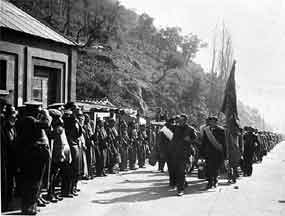Showing posts with label humanity. Show all posts
Showing posts with label humanity. Show all posts
Friday, January 12, 2018
something passing
Here, stashed behind a woodpile, miles from the Capitol, loneliness surfaced at first in moments. The times waiting linger like an anchor. The feeling that one should engage more with the world takes root. But, why, when doing so always ends the same?
Labels:
America,
dream,
feeling,
humanity,
loneliness,
love,
misanthrope,
moving,
prose,
relationships,
relocation,
solitude,
stranger,
writing
Friday, October 25, 2013
something about the film "Blade Runner"
1982's "Blade Runner" is a noir-ish, dystopian, science fiction film directed by Ridley Scott and starring Harrison Ford and Rutger Hauer. In 2019 powerful corporations have manufactured genetically engineered organic robots called replicants to do dangerous and menial work on off-world colonies. Replicants are almost indistinguishable from humans, but they are engineered to live short lives--a few years, max.
When some replicants rebel on one of the colonies, they are banned from Earth; any of them discovered back on Earth are hunted down and "retired" by special operatives known as Blade Runners. The film tells the story of a group of recently escaped replicants hiding in Los Angeles, and the veteran Blade Runner, Rick Deckard (Harrison Ford), hired to hunt them down.
The Tyrell Corporation is a major producer of replicants. Their slogan, "More Human Than Human," encapsulates the philosophical, physiological, and moral dilemma posed by the film: What does it mean to be human?
The slogan "More Human Than Human" doesn't merely pitch the advanced abilities of the intelligent, physically gifted replicants. It seems to differentiate and dehumanize replicants. It focuses on their otherness, and encapsulates it in the word more. But is there a difference? Can one human be more human than another?
Roy, played by Rutger Hauer, represents the newest, most advanced model of replicant. As the film's action rises, Roy breaks into the the penthouse occupied by the CEO of the Tyrell Corporation and demands more life from his maker. His manner is sinister, but his needs are all too human. At the end of the film, as his life runs out, Roy, resigned to his inevitable death, delivers a monologue regretting how his memories are about to be lost forever.
The film leads us to conclude that our protagonist, Deckard, is nothing more than a murderer. Does he share this view of himself? In the version of the film with voice-overs, he only refers to himself as a killer.
Notes:
- The screenplay is loosely based on a Philip K. Dick novel.
- Drawing distinctions between peoples helps justify killing.
Labels:
1982,
Blade Runner,
criticism,
dystopian,
film,
Harrison Ford,
humanity,
morality,
noir,
philosophy,
review,
rhetoric,
Ridley Scott,
Rutger Hauer,
science fiction
Saturday, July 16, 2011
This means war
 Midway through Ernest Hemingway's The Sun Also Rises, two young guerrillas named Andres and Primitivo probe American expat Robert Jordan about politics and wealth in the US. Andres asks, "Do you have any big proprietors?" Then, "But there are not great estates that must be broken up?" The narrative goes on with Jordan answering,
Midway through Ernest Hemingway's The Sun Also Rises, two young guerrillas named Andres and Primitivo probe American expat Robert Jordan about politics and wealth in the US. Andres asks, "Do you have any big proprietors?" Then, "But there are not great estates that must be broken up?" The narrative goes on with Jordan answering,"Yes. But there are those who believe that taxes will break them up."
"How?"
Robert Jordan, wiping out the stew bowl with bread, explained now the income tax and inheritance tax worked. "But the big estates remain. Also, there are taxes on the land," he said.
"But surely the big proprietors and the rich will make a revolution against such taxes. Such taxes appear to me to be revolutionary. They will revolt against the government when they see that they are threatened, exactly as the fascists have done here," Primitivo said.
Subscribe to:
Posts (Atom)
